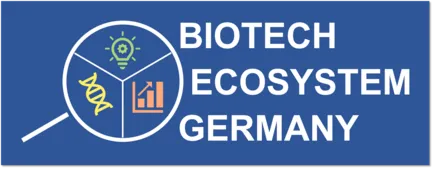Biotech Ecosystem Germany

Project Description

The project “Biotech Ecosystem Germany” was triggered by the notion that there is still a significant discrepancy between the outstanding scientific research in Germany and its unsatisfactory transfer into marketable products that contribute to economic value creation. While limited access to capital is often a first choice explanation, we want to shed light on the entire ecosystem, highlighting the context with pros and cons of the German setting.
On the financial side, we see that only 1.5% of a total of € 6.2 billion in venture capital for German start-ups was invested in biotech companies in 2019 (Start-up Barometer, Jan 2020, Ernst & Young). Of the € 479 million in venture capital invested in German biotech companies in 2019, 61% (€ 290 million) is attributable to one single company – BioNTech (Deutscher Biotechnologie-Report 2020, Ernst & Young). After zero IPOs in 2018, there were two IPOs of German biotech companies in 2019. However, both of which were listed on the NASDAQ of the US stock exchange.
From an educational perspective, we notice that many scientists are not familiar with business concepts, as their studies were primarily focused in the scientific side and didn’t cover any business aspects. As the aimed for transfer of science into technologies needs a business perspective, we aim overcome this hurdle by creating a comprehensive “business for scientists” course. The course is based on cases from the field of biotechnology start-ups to convey the necessary knowledge in a hands-on manner.
Thus, the project strives to promote the transfer of scientific knowledge into economic value creation. It thereby adds to numerous initiatives by the federal government to support the biotech industry and thereby strengthen Germany as a hub for innovation. Its results are twofold and will include an extensive analysis of the strength and weaknesses of the German biotech ecosystem that serves as input for future measures. Additionally, it will provide practical business know-how for natural scientists to assist in the establishment of new biotech businesses and improve their chances of success.
The research project is sponsored by the Federal Ministry of Research and Education (FMER) as part of the national GO-Bio initiative.
Approach
The project consists of two subprojects - a study of the German biotechnology start-up ecosystem with a focus on financing challenges and the development of an online course for start-up-relevant knowledge targeted at natural scientists. Both input and output are generated and mirrored in close cooperation with industry participants. Expert interviews, case studies, and the use of industry figures ensure the project's practical relevance and target group congruence.

Subproject 1: Study to identify the strengths and weaknesses of the German biotech start-up ecosystem
The popular scientific study serves to inform actors in the German biotechnology ecosystem as well as the public. Its goal is to identify drivers and constraints in the development of biotechnology ventures in the German ecosystem. The emphasis in the identification and analysis of drivers and constraints is placed on actors and framework conditions that influence biotechnology venture financing.
Alongside quantitative analysis of previous biotechnology financing, one field of interest are the consequences of financial bottlenecks in medical biotechnology ventures and their influence on business model adaptations. A second field of interest is the technology transfer process via biotechnology spin-outs and how it impacts the prospects of subsequent spin-out financing.
Through expert interviews with founders, industry experts, and key actors in the ecosystem, in-depth case studies, and quantitative analysis, we show how the various sectors of the biotechnology industry capitalize on the strengths of the German ecosystem and where adverse conditions inhibit sustainable development. The study will be published in autumn 2023.

Subproject 2: Development of an entrepreneurship training program for natural scientists
The development of an online course is aimed specifically at natural scientists who have had little contact with business fundamentals. It strives to equip them with the know-how to successfully market their research results. Besides an online course, the contents will also be used to form an extensive textbook, including case studies, that is suitable for both lecturers and students. To identify the need for business knowledge and to collect case studies, interviews will be carried out with experts and natural scientists in various positions and fields of work. The course will also draw on the experience of lecturers with deep insights in industry, business and teaching.
The training program will be accessible on the EdX platform under the title “Realizing Biotech Innovation – A Business Guide for Scientists”. It will consist of three courses with a specific focus each:
- Course 1: “Biotech—From Science to Business”
- Course 2: “How to Start a Biotech Venture”
- Course 3: “Financing Biotech Innovation”
Course Descriptions:
Biotech—From Science to Business
New scientific discoveries in the biotechnology field can potentially change the world we live in. To do so, they need to be made available to the world. This course will help to build the knowledge and confidence to evaluate a biotech innovation's potential and develop a strategy for success.
The course illustrates the challenges of biotech entrepreneurship and what it means to start a biotech venture. It teaches the methods needed to evaluate the potential of biotech innovations and how to define a suitable business model. Participants learn how to develop a strategy to pursue with their venture and which first steps to take when starting their entrepreneurial journey.
How to Start a Biotech Venture
Biotech companies are revolutionizing the world we live in. However, when starting a biotech venture, innovators face business challenges that go beyond regular business formation. This course can help to get a biotech innovation off the ground and helps to broaden the perspective in terms of what are key business aspects to be mindful of as an early-stage biotech entrepreneur.
To do so the course offers insights into how to build a high-performing team, how to manage the business's finances, how to ensure the venture is aligned with the market you are operating in, how to protect your intellectual property, and how to navigate legal and regulatory challenges. Thereby, it strives to provide learners with the knowledge and confidence to tackle a plethora of strategic and operational challenges they are going to face as biotech entrepreneurs.
To harvest the enormous potential of ground-breaking research in the field of biotechnology, large amounts of financing are needed. From the first lab results to a commercially viable product many years go by and much money is burnt. The course addresses this enormous challenge of financing biotech innovations and thus helps making it accessible for everyone.
To do so, the course offers an introduction to financing and discusses the different motivations of those involved in financing. It will also enable learners to evaluate different sources of financing. Moreover, it will establish an understanding of the challenges faced during to fundraising process such as valuing a company, the legal aspects of an investment contract, or pitching a company to investors. Thereby, it strives to provide learners with the confidence of managing the fundraising process and communicating an innovation project effectively to any type of financier.
Team





Dr. Svenja Jarchow
Project Management
jarchow(at)tum.de
Steffen Grebe
Subproject 1
steffen.grebe(at)tum.de
Stefanie Weniger
Subproject 2
stefanie.weniger(at)tum.de
Moritz Gerling
Student Assistant
Josephine Melcher
Student Assistant
Sponsor

Sponsored by the Federal Ministry of Education & Research
Funding Area: GO-Bio
Funding Reference: 161B0954
Supporters & Collaborators
The project is embedded in the existing biotechnology landscape and draws on the support of various initiatives.

Additionally we are grateful to learn from many experts in the field who share their expertise and experiences as part of the project:
- Dr. Siegfried Bialojan (biotech expert, retired from Ernst & Young)
- Dr. Sascha Berger (TVM Capital)
- Prof. Dr. Horst Domdey (BioM)
- Dr. Manfred Gröppel (Groeppel Concepts, co-founder of Immunic)
- Dr. Marion Jung (Chromotek)
- Dr. Christoph Massner (Earlybird Venture Capital)
- Dr. Katrin Schmidthals (Chromotek)
- ...
Contact
Dr. Svenja Jarchow
Center for Entrepreneurial and Financial Studies (CEFS)
Technical University of Munich
Arcisstr. 21 | 80333 Munich | Germany
Phone: +49 (89) 289 25196
Fax: +49 (89) 289 25188
Mailto: jarchow(at)tum.de
Sources:
Icons erstellt von https://www.flaticon.com/de/autoren/surang; https://www.flaticon.com/de/autoren/itim2101